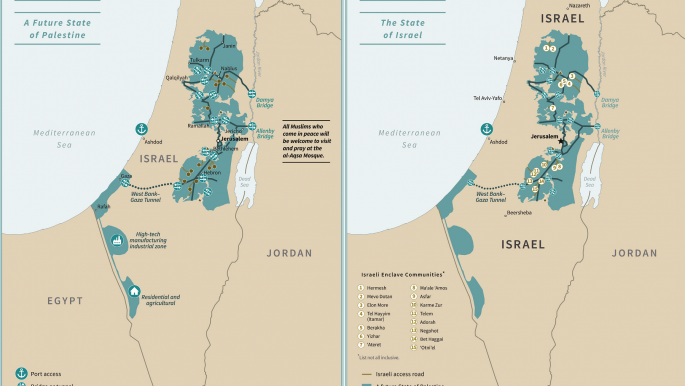The 5 most outrageous proposals in Trump's bizarre 'Deal of the Century'
Instead, it has been interpreted as a green light by the US for the status quo of Israeli land grabs, annexation and ethnic cleansing of Palestinians - key markers of the Trump administration's stance towards the conflict.
Although the Palestinian side has said for years it rejects the partisan efforts of the US to iron out the thorny issues of settlements, refugees, and Palestinian statehood that have marred the conflict for decades, Trump's plan puts forward a host of openly objectionable proposals. Here are just a few of them.
Comprehensive annexation
As Netanyahu said in his speech at the White House on Tuesday, all areas not marked as Palestinian in the peace plan will fall under Israeli sovereignty. Worryingly, Israel is now free to begin a process of annexation at any time, according to the US ambassador to Israel, David Friedman.
As the plan's "conceptual map" shows, roughly 30 percent of West Bank's territories will be handed over to Israel, leaving isolated enclaves of land - what many have likened to a swiss cheese - for a Palestinian mini-state.
Furthermore, many have cast doubts about the viability of the infrastructure and "effective transportation system" that the US proposes will link these Bantustans into a continguous territory, albeit interspersed with Israel-controlled checkpoints.
As Israeli human rights organisation Btselem have remarked, the proposed system is "not peace, but apartheid".

Normalisation and BDS
"The United States will strongly encourage Arab countries to begin to normalise their relations with the State of Israel and negotiate lasting peace agreements," the plan says.
It goes further to call on all Arab states to cease all "anti-Israel initiatives" including any type of boycott, including the Boycott, Divestment, Sanctions (BDS) movement.
Of the 22 Arab states, only Egypt and Jordan have enacted peace deals with Israel that allow for regular diplomatic relations.
Despite creeping normalisation of ties between Gulf Arab countries and Israel, an expedited diplomatic effort would cause widespread popular resistance. The suggestion that ths deal can be done overnight is also viewed as farcical.
Furthermore, the pressure to eliminate boycott movements - for state and non-state actors allied to the Palestinian cause, as well as Palestinians in the diaspora - this remains the only means of peaceful resistance against Israeli human rights violations.
Cancel ICC investigations against Israel
The plan calls on the Palestinian side to: "Take no action, and [...] dismiss all pending actions, against the State of Israel, the United States and any of their citizens before the International Criminal Court, the International Court of Justice, and all other tribunals."
This refers to the recently opened investigation by the International Criminal Court (ICC) into possible Israeli war crimes in the occupied Palestinian territories, four years after the Palestinian Authority filed the case.
The annoucement of the investigation in December revived hopes among the Palestinian population that justice may still be served against Israel's war crimes.
The Israeli reponse to the investigation - to delegitimise the court and attack the judge - was interpreted as a sign of panic that it may be held to account. Its inclusion in the terms of the plan is a further attempt to shirk the repercussions of its oppression of Palestinians.
In the same clause of the plan, it calls on the Palestinian Authority to "refrain from any attempt to join any international organisation without the consent of the State of Israel", blatantly signalling again that the vague gesture to Palestinian statehood is far from actual sovereignty.
Twitter Post
|
Capital: Abu Dis, not East Jerusalem
As well as maintaining the reviled separation barrier that cuts through Jerusalem, the city itself will remain capital of Israel, the plan posits.
The capital of the Palestinian state will lie behind Israel's wall, in the outskirts of Shuafat - currently a large refugee camp - as well as Abu Dis and some other peripheral areas.
"Kindly", though, the proposal offers the Palestinians to rename this area "Al Quds", the Arabic name for Jerusalem "or another name as determined by the State of Palestine".
No return for refugees
Chiefly, though, "There shall be no right of return by, or absorption of, any Palestinian refugee into the State of Israel", denying refugees' right of return, as enshrined in international law.
Their three options are offered as firstly, moving to and being absorbed into the future state of Palestine.
However this has a caveat of being limited to a rate so it will not overwhelm the infrastructure of a future Palestinian state, or threaten security of Israel, or contravene any security arrangements it has with other countries.
Secondly, it offers integration into refugees' host countries, but again, this is "subject to those countries' consent", and which is again, unlikely.
Thirdly, there is a proposal for countries belonging to the Organisation of Islamic Cooperation (IOC), to accept 500 refugees per year for 10 years.
However again this is given a caveat that IOC countries can opt in to the scheme, and give their individual consent, which the US does not have control over.
Secondly, a total of 50,000 refugees is a tiny proportion of the roughly 7 million across the world.
Twitter Post
|



